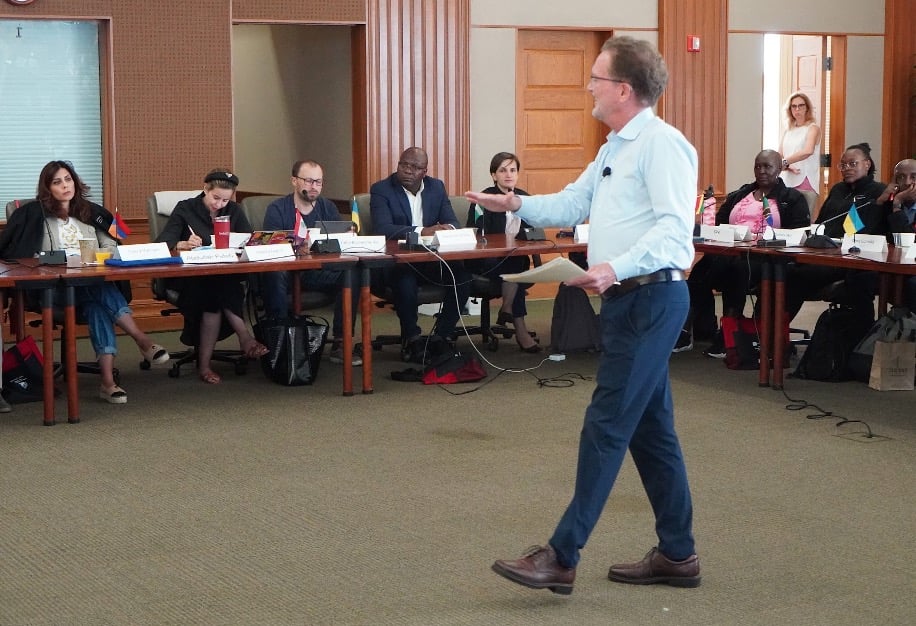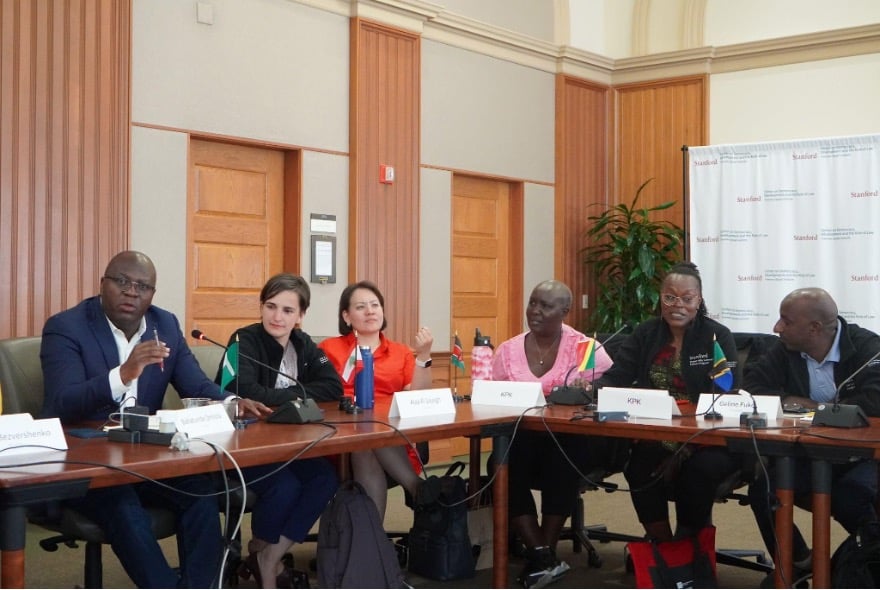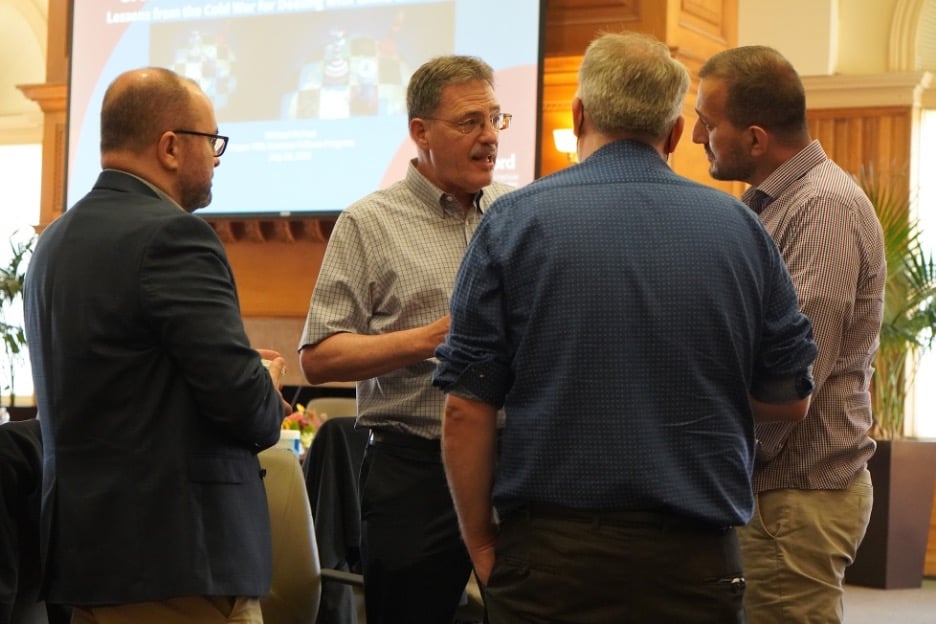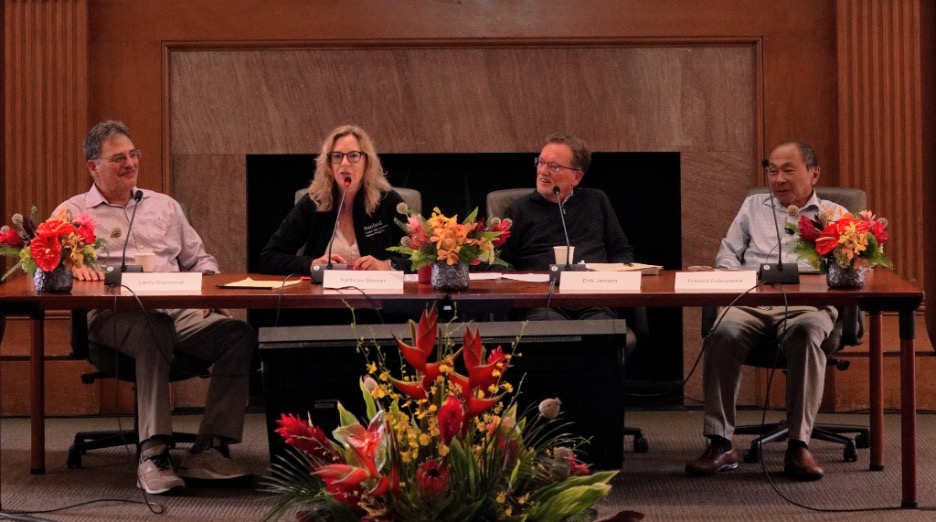For nearly two decades, Stanford has played host to what has quietly become one of the most influential pipelines to world leadership. Drawing 32 rising democratic leaders from 26 countries, Stanford’s Center on Democracy, Development, and the Rule of Law (CDDRL) takes on a daunting annual task: Help shape the next generation of international decisionmakers, many of whom will soon be at the forefront of global change.
Clearly, the program leaders — preeminent political scientists including democracy scholar Larry Diamond ’73 M.A. ’78 Ph.D. ’80, world-renowned political philosopher Francis Fukuyama, law professor Erik Jensen, CDDRL Director Kathryn Stoner, and former United States Ambassador to Russia Michael McFaul M.A. ’86 — are up to the task.
“When you see pictures today of Ukrainian President Volodymyr Zelenskyy in his bunker in Kyiv, Serhiy Leshchenko is right next to him. He’s one of our graduates,” Fukuyama said.
The Draper Hills Summer Fellows Program is an intensive academic training summit hosted by the CDDRL that selects each class of global democratic leaders based on the existing work they have done to promote and protect democratic norms, as well as their potential to create more impact following the training program.
“It all started in 2005 with Michael McFaul’s audacious idea that we could launch a Summer Fellows Program and try to train and interact with 30 of the brightest, most promising practitioners we could find around the world,” said law professor and Draper Hills lecturer Erik Jensen.

Since then, Jensen said, the program has grown significantly, thanks to the generous support of Bill Draper and Ingrid von Mangoldt Hills, with even “more faculty who wanted to participate than we could accommodate.”
According to Fukuyama, Draper Hills has become an important forum for training democratic leaders around the world.
“We try to provide a mixture of practical skills, networking tools and a stronger intellectual foundation so they can think about their future careers to determine the most strategically impactful way they can behave and act in the present,” he said.
In recent years, the program has shifted its focus toward technology, global warming and poverty, which increasingly figure large roles in the fight for democracy, according to Jensen. Case studies, panels and guest lectures from international experts fill the fellows’ three weeks on campus.
Outside of their classes in the Bechtel Center, the fellows tour San Francisco landmarks and enjoy group dinners hosted by the core faculty. In previous years, for example, fellows have visited local technology firms like Twitter, Google and Facebook to explore “how democracies and autocracies can use technology to promote their goals,” Stoner said.

With help from the program, Draper Hills Fellows have consistently become leaders in law, politics, civil society organizations and international development after graduation, with a growing alumni network of almost 400. Renchinnyam Amarjargalis, the former Prime Minister of Mongolia, was a fellow in 2005, along with other alumni who have risen to international prominence.
Diamond added that the Foreign Affairs Minister of the government in exile of Myanmar, Zin Mar Aung, is also a former Draper Hills Fellow, and has become “one of the most important leaders of the opposition in Burma fighting for democracy.”
The Draper Hills program gives its fellows more confidence and tools to see their work and struggles in a larger context, according to Diamond.
“Once you realize it’s part of a global pattern, you don’t feel that your national situation is quite so cursed,” he said. “You can draw strength from this solidarity and the sharing of experiences.”

Beyond the three weeks of the program, fellows remain connected to one another through on-campus gatherings, WhatsApp channels and regional workshops around the world.
“As fellows, we are part of a very great network that always reminds us that, as activists for democracy and human rights, we are not alone,” said former Peruvian Minister of Education and current Draper Hills Fellow Daniel Alfaro. “There are others like us who are great fighters.”
Participants, many of whom are already rising leaders in international democratic movements, are starting to see how valuable the program will be for their future work.
“Draper Hills has already expanded my horizons in terms of the roles that I can play in Mexican society to promote change, and provided many important allies and a network that can support these changes,” said current fellow Mariela Saldivar Villalobos, a Mexican activist and politician. “I feel deeply honored to have this opportunity. And I hope one day, Stanford will feel proud of investing its time and talent in me.”
This article has been updated to reflect that Kathryn Stoner is the Director of the CDDRL. A previous version of this article incorrectly identified Stoner as the Deputy Director. The Daily regrets this error.
